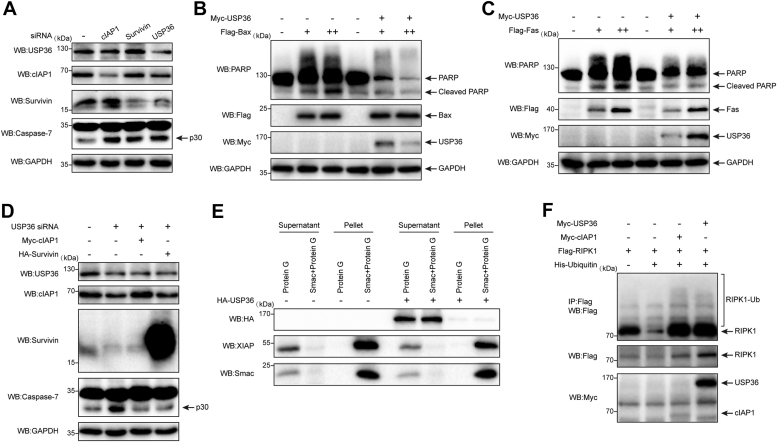Figure 8.
USP36 inhibits apoptosis via the stabilization of survivin and cIAP1.A, HCT 116 cells were transfected with siRNA against the genes encoding cIAP1, survivin, or USP36 for 72 h. Proteins were extracted and subjected to Western blotting. Cell death was determined by cleavage of caspase-7. B, HCT 116 cells were transfected with increasing amounts of Flag-Bax individually or together with Myc-USP36. Cleavage of PARP indicated apoptosis in protein extracts. C, HCT 116 cells were transfected with increasing amounts of Flag-Fas individually or together with Myc-USP36. Cleavage of PARP indicated apoptosis in protein extracts. D, HCT 116 cells were transfected with USP36 siRNA alone (lane 2), with USP36 siRNA and Myc-cIAP1 together (lane 3), or with USP36 siRNA and HA-survivin together (lane 4). Cell death was determined by cleavage of caspase-7. E, HEK-293 cells were untreated (−) or transfected with HA-USP36. The uncoupled protein G and Smac-coupled protein G beads were collected after incubating with the cell lysates. Protein bound to the beads was eluted (Pellet). Supernatants from cell lysates treated with uncoupled protein G or Smac-coupled protein G beads, and pellets were analyzed using SDS-PAGE. F, HEK-293 cells were cotransfected with the indicated plasmids. Cells were harvested after 24 h. Proteins were extracted, immunoprecipitated with Flag beads, and blotted with the anti-Flag antibody. HA, hemagglutinin; HEK, human embryonic kidney; IAP, inhibitor of apoptosis protein; PARP, poly-ADP ribose polymerase; RIPK1, receptor-interacting protein kinase 1; Smac, second mitochondria-derived activator of caspase; USP36, ubiquitin-specific protease 36.

